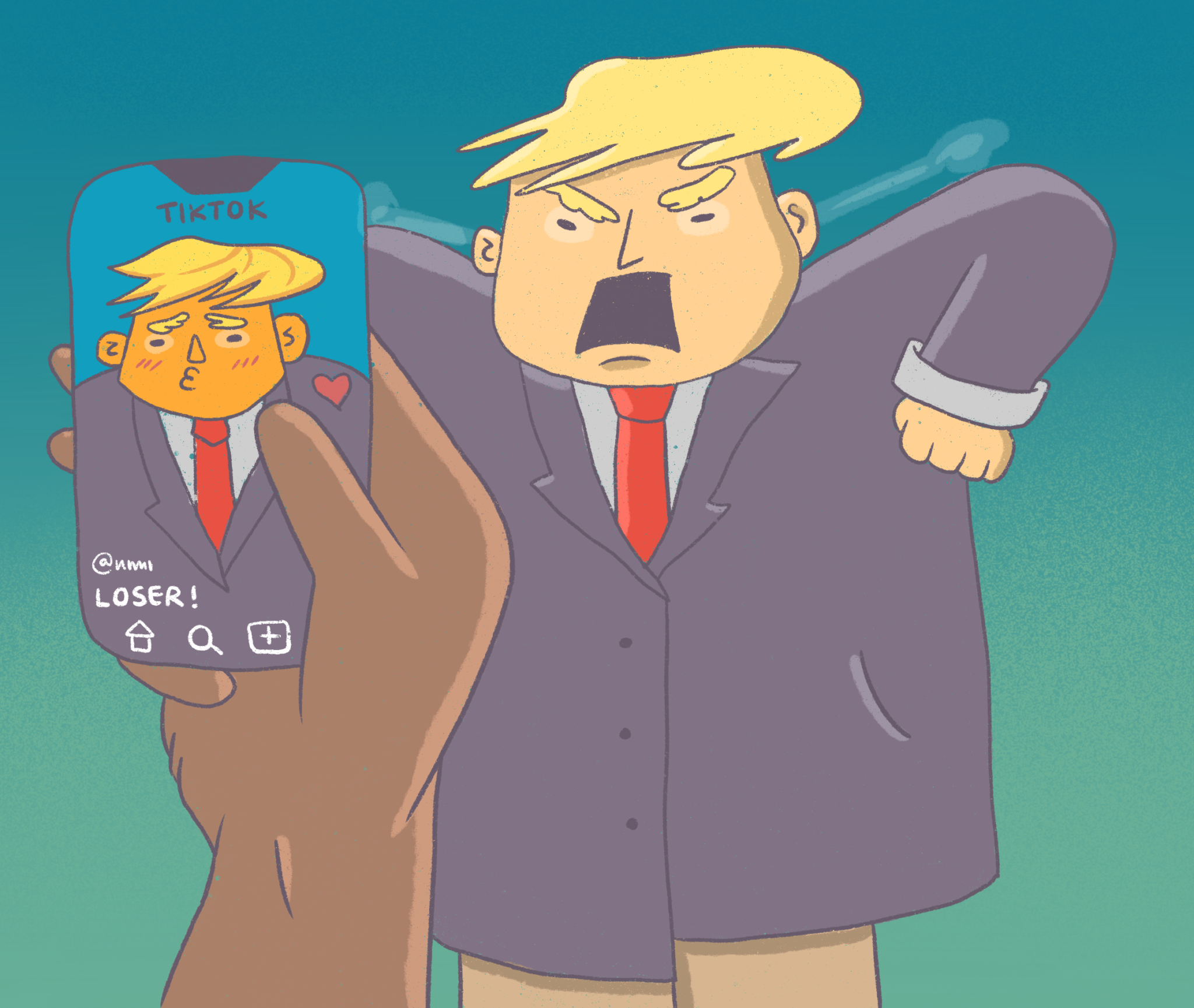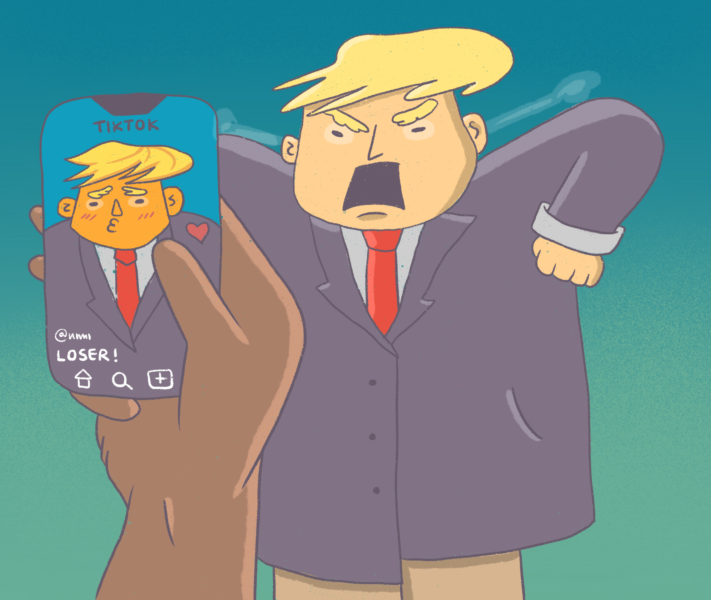
Threats of a ban on the popular social media application TikTok became reality in August when President Donald Trump issued an executive order that stated the app would be banned 45 days later on Sept. 20, unless an American firm could be recruited to buy out TikTok’s U.S. operations, out of concern that the People’s Republic of China might be able to use TikTok to spy. Currently, business negotiations around TikTok are set to end on Nov. 12, after which TikTok would be banned if it is not bought by an American company, which leaves the content and users who rely on the platform unsure of the future of the app.
An upcoming ban could creators with large followings. Senior Jessica Chen amassed over 46,000 followers by posting her daily routines.
“When the first ban rumor came I was skeptical because a lot of news sources were incorrect, but when creators went live and said goodbye to their followers it made me really emotional,” Chen said. “By gaining this platform I’m super thankful to have this position to post what I like and have people enjoy it.”
TikTok is used by a young demographic; 41% of the app’s users are between the ages of 16 and 24. Senior Rumi Loghmani maintains more than 170,000 followers on the app by posting art content. He cites the algorithm for his success.
“TikTok is really good at making people blow up with the For You page,” Loghmani said. “That’s how you find videos. The For You page is your main source of new content, so it blows you up by forcing the users to see stuff to keep consuming content.”
The reasons cited for the potential ban stemmed from the company’s ownership. TikTok is owned by ByteDance, a parent company that is based in China. Concerns arose due to the company’s possible connection to the Chinese Communist Party, and the fact that user data may be collected and stored outside of the U.S. TikTok denies that user data isn’t secure, stating that their data is stored in the U.S. with a backup in Singapore.
“The GOP and Congress and the Democratic minority leader of the Senate expressed that this is an issue and one that needs to be looked into, and [that] there are security risks there,” said history teacher William Colglazier.
TikTok is prohibited on government-owned phones, specifically by the Department of Homeland Security, Transportation Security Administration and the U.S. Armed Forces. Both the House of Representatives and the Senate voted in favor of prohibiting downloads on government phones. These precautions point to the data concerns laid out in the executive order. Issues with TikTok are not unfamiliar to global governments. India recently banned the app altogether due to the same fears. This issue of national security is within the President’s control, since he is also Commander in Chief and he commands the umbrella of national security.

The main concept that drives national security concerns with TikTok is the fact that it’s not an American company.
“The main fix would be that user data would be stored in the U.S. [after an acquisition],” Colglazier said. “That would be sufficient to make the U.S. government feel confident that the American companies wouldn’t give the data away to a foreign government, and the American company CEOs are beholden to subpoenas from Congress or a grand jury, so that level of jurisdiction by putting the company in the U.S. gives our government some leverage in the issue of national security.”
After the initial executive order was released, three companies emerged in attempts to work with TikTok. Microsoft, Oracle and Walmart all made offers to buy the company or make a deal. ByteDance rejected Microsoft’s offer, leaving Oracle and Walmart as potential business partners. The U.S. Department of Commerce extended the upcoming ban for a week on Sept. 20, giving the companies time to work out a deal.
However, the current details of the business deal are unknown. Oracle and Walmart are poised to share 20% of a newly formed company called TikTok Global that would be American owned. However, ByteDance has claimed that they would own 80% of TikTok Global. The deal wouldn’t work if a foreign company owned a majority of the new company, and Oracle and Walmart claim that ByteDance will have no ownership of a new company. As of now, Federal Judge Carl Nichols blocked the delayed Sept. 27 ban and thus the businesses have a Nov. 12 deadline.
National security may not be the only driving force at play with a potential ban. On Juneteenth, the Trump campaign’s Tulsa rally was the victim of a mass trolling driven by TikTok and Twitter users. The users mass reserved tickets to the rally to impact turnout, and their intended effect took place.
“It creates a community because we were all able to band together to accomplish this one thing,” said Hillsdale junior Sophia Heath. Heath is president of the San Mateo chapter of Coalition Z, a youth-led activism group that works against injustices in the community and aims to increase youth voter turnout. “Even I reserved a seat, and we all had a common goal so it made it a bonding experience. The Tulsa rally also really helped create political TikTok and that platform for activism.”
Brad Parscale, a senior adviser for President Trump, tweeted that over one million tickets had been reserved. The auditorium for the event could only hold 19,000 people, and turnout was estimated to be much lower than the reserved number of tickets. Shortly after the rally in July of 2020, U.S. Sens. Chuck Schumer, D-New York, and Tom Cotton, R-Ark, voiced their concerns about TikTok’s security, and this led into the executive orders in August.
“I think Trump is being absurd for focusing on banning an app for entertainment while we’re in the middle of a pandemic that he’s handled really poorly; he can’t mandate masks or support Black Lives Matter, but he can ban an app, which seems irrelevant and not a super big deal,” Heath said. “There are concerns with the Chinese government having our info, but everyone has their information regardless of a singular app. All social media collect data and it wasn’t a super big concern that was about TikTok specifically.”
As for whether banning an app is censorship, the answer is unclear. The government reserves the right to regulate speech, such as threats. The right to freedom of speech and freedom of expression are inalienable, but not absolute. There isn’t a precedent for situations involving the constitutional right to social media. The internet and subsequently these types of media are so relatively new there isn’t legal precedent of foreign ownership of social media.
“I read ‘The Handmaid’s Tale’ by Margaret Atwood and this quote really resonated with me and I think it’s relevant; ‘Nothing changes instantaneously: in a gradually heating bathtub, you’d be boiled to death before you knew it,’ and I feel like that describes the situation,” Heath said. “We don’t know we’re in authoritarianism. We can’t tell, but this is only the beginning. If we let him get away with this, what are we going to let him get away with next.”
Because a federal judge blocked the 45 day ban that would have banned TikTok on Sept. 20, there is a degree of hesitation around the legality of the ban.
“There is an argument to be made that it is a violation of free speech, but there’s also national security aspects at risk, so it becomes a fuzzy area of constitutionality,” Colglazier said. “The outward claim of national security seems to have some validity, so we ask, ‘What is Trump not saying?’ We’re not saying that criticizing China is good for him politically—going after this company, but not going after Russia’s influence in our elections. The evidence says that Russia meddled in our election, and he’s saying that a Chinese company’s ownership of TikTok has the potential to have national security implications. We’re in this whole action based on a possible fear of data breach. There was already that happening by the Russian government. There has to be some political issues because you’re not seeing a consistent policy.”
The outcome of the business deal between Oracle, Walmart and TikTok will solidify the fate of the beloved by many app will become clear as time goes on. In the meantime, creators and users of the app will weigh their options when considering how to proceed with creating and viewing content.
“The platform I built was super special, and it was hard to let that go,” Chen said. “If something happens a lot less people will be on the app, and it’ll decrease views. There are bigger issues in the world, but it’s hard to give up stuff you care about.”
With the American user base of TikTok at risk, the communities built on the app may face consequences from the ban. The platform’s differences from other social media, such as altered comment sections and easy interaction with creators, added to connections made through TikTok.
“TikTok brings a lot of people together,” Loghmani said. “It’s given me the opportunity to meet a lot of new people. Some people I’ve met on TikTok are huge now, and it really builds community.”
The Nov. 12 deadline for business negotiations with TikTok remains. Until then, American users can use the app as normal.
